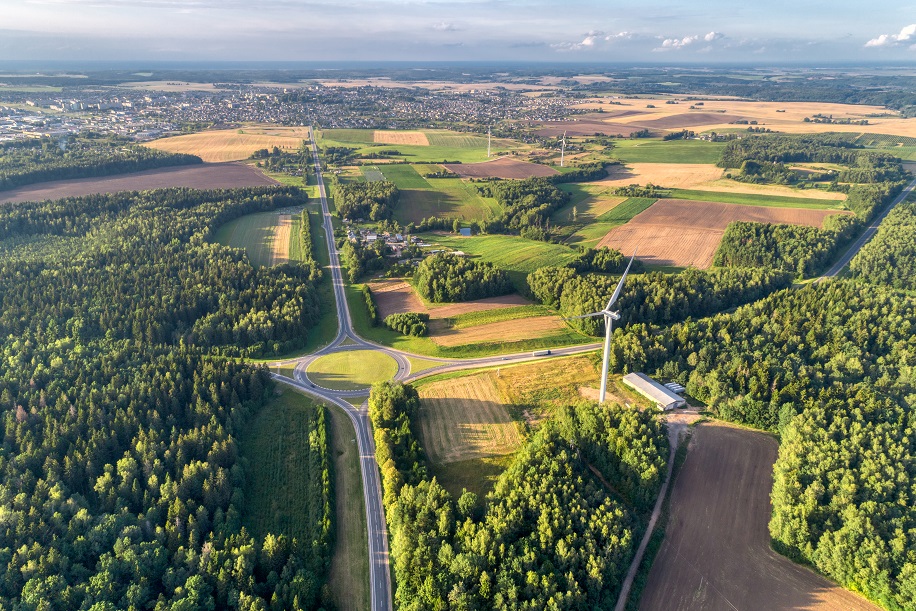.jpg)
Embracing Sustainability in Highways & Infrastructure: The Road to Achieving the UK's 2050 Net Zero Targets
In the face of environmental concerns and the urgent need to combat climate change, the importance of sustainability in the infrastructure industry cannot be overstated. As the United Kingdom ambitiously sets its sights on achieving net-zero carbon emissions by 2050, the role of the infrastructure sector has quickly become pivotal. This article explores the significance of sustainability in the industry, drawing on the UK's 2050 net zero targets and more closely related to our highways team, the National Highways' environmental sustainability strategy.
UK's 2050 Net Zero Targets
The UK government's commitment to achieving net-zero carbon emissions by 2050 represents a landmark goal in the global fight against climate change. This ambitious target demands a comprehensive re-evaluation of practices across all sectors, with the infrastructure industry playing a crucial role in reducing carbon footprints and embracing sustainable practices. A recent BBC report highlighted the urgency of such measures and underscores the need for a collective effort to address the environmental challenges ahead.
National Highways' Environmental Sustainability Strategy
National Highways, the strategic road network operator in England, has recognised the importance of sustainability in the infrastructure industry and we heard first hand, at Highways UK 2023, their commitment to biodiversity, ecology and managing the roadside verges as an asset, meaning funding will now be assigned and directed to improving and maintaining these parts of our network.
Their environmental sustainability strategy, outlined in a comprehensive document, available on their website, outlines a roadmap for integrating sustainability principles into their operations. The strategy emphasises reducing carbon emissions, enhancing biodiversity, and promoting circular economy practices. By setting out clear objectives and action plans, National Highways is setting an excellent example to the industry, taking a proactive stance in aligning with the UK's net zero targets.
The Role of Major Contractors
Not just the network operators, but all the affiliated contractors in the industry will also have a pivotal role to play in realising our goals. Beyond complying with regulations, these industry leaders can spearhead innovative approaches that go above and beyond mere sustainability. Collaboration, investment in green technologies, and the integration of renewable energy sources are key steps that major contractors can take to contribute meaningfully to the country's environmental objectives. Many of the businesses we are partnered with are already moving in this direction, with innovative ways to do work quicker, cleaner whilst being more cost effective, but it is going to take an industry wide initiative for these implementations to have a direct impact.
Transcending Politics
It is also crucial to recognise that the pursuit of sustainability in the infrastructure industry should transcend political divides and unite us in the face of a common environmental challenge. Turning this critical issue into a political battleground risks undermining the collective effort needed to achieve the UK's 2050 net zero targets. Climate change is a global threat that affects all of us, regardless of the political affiliations or the online communities we are part of. As we address the urgent need for sustainable practices, it is imperative to foster bipartisan cooperation and bridge the gaps that might otherwise hinder progress. The environmental impact extends beyond party lines, making it essential for stakeholders from all walks of life to come together, embracing a shared responsibility to secure a sustainable and resilient future for the UK and the planet as a whole.
We Must Take a Collaborative Approach
As the infrastructure industry navigates the path towards sustainability, the UK's 2050 net zero targets can serve as a North Star, guiding the way forward. National Highways' environmental sustainability strategy exemplifies a commitment to these objectives, providing a blueprint for others in the industry to follow. Major contractors, as key stakeholders, must embrace the challenge and prioritise sustainable practices in their projects. It may be cheaper in the short term to ignore these targets but it will quickly become much more expensive for the us in the future, and the generations that follow.
Achieving the UK's net zero targets requires a concerted effort from all corners of the infrastructure industry. Major contractors, by adopting innovative and eco-friendly practices, can not only meet regulatory requirements but also lead the charge towards a greener, more sustainable future. By prioritising sustainability, the infrastructure sector is perfectly positioned to contribute significantly to the collective goal of combating climate change and ensuring a healthier planet for generations to come.
There is always more to be done, and we also want to recognise the steps already being taken by others in the infrastructure industry such as Network Rail, and others from the utilities, power, telecoms and transport industries.
Get in touch to discuss more, and see how we can help with your sustainability targets.
Sources:
https://www.bbc.co.uk/news/58160547
